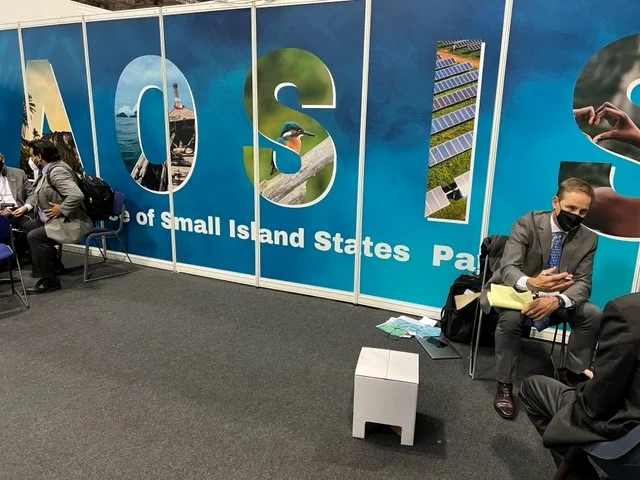By Pita Ligaiula in Glasgow
The Alliance of Small Islands States (AOSIS) is unhappy with the language of the United Kingdom COP26 draft text released Wednesday.
It warned that the language in the text is not strong enough to prevent dangerous warming and keep 1.5C within reach.
AOSIS Chair Aubrey Webson said the UK draft COP text: ‘Urging’ ‘encouraging’ and ‘inviting’ is NOT the decisive language that this moment calls for.
“We have limited time left at Cop26 to get this right and send a clear message to our children, that we hear you and are taking this crisis seriously.
He said the text provided a basis moving forward but it needs to be strengthened in key areas in order to respond to the needs of the most vulnerable, particularly on finance.
“We won’t get the ambition on emissions we need for 1.5C, if we don’t scale up the provision of finance, and this includes the long overdue recognition of a separate and additional component for Loss and Damage,” said Webson.
The text called on countries to raise their ambitions to cut greenhouse gas emissions by next year, acknowledging that current pledges fall short of what is needed to avert climate catastrophe.
It asks countries to “revisit and strengthen the 2030 targets in their nationally determined contributions, as necessary to align with the Paris Agreement temperature goal by the end of 2022”.
In the Paris Agreement, countries agreed to limit global warming to well below 2 degrees celsius above pre-industrial levels and try to cap it at 1.5C.
Britain already said the aim of the COP26 conference is to “keep alive” the 1.5C goal.
“It is time for nations to put aside differences and come together for our planet and our people.
“We need to pull out all the stops if we’re going to keep 1.5C within our grasp.,” British Prime Minister Boris Johnson said in a statement on Wednesday.
The document urged countries to speed up efforts to stop burning coal and to phase out fossil fuel subsidies – taking direct aim at the coal, oil and gas that produce carbon dioxide, the primary contributor to manmade climate change
The draft “urges” developed countries to “urgently scale up” aid to help poorer ones adapt to climate change, and said more funding needs to take the form of grants, rather than loans that burden poor nations with more debt. But it does not include a new plan for delivering that money.
Developing countries and campaigners have also raised concerns over the provision of finance for poorer nations to cope with the impact of climate change in the draft deal.
Environmental campaigners criticised the draft deal, with Greenpeace International executive director Jennifer Morgan saying it was “not a plan to solve the climate crisis”.
“It’s a polite request that countries maybe, possibly, do more next year,” she said.
The draft final version of which must be agreed by consensus of nearly 200 countries at the Glasgow summit.
SOURCE:PACNEWS














